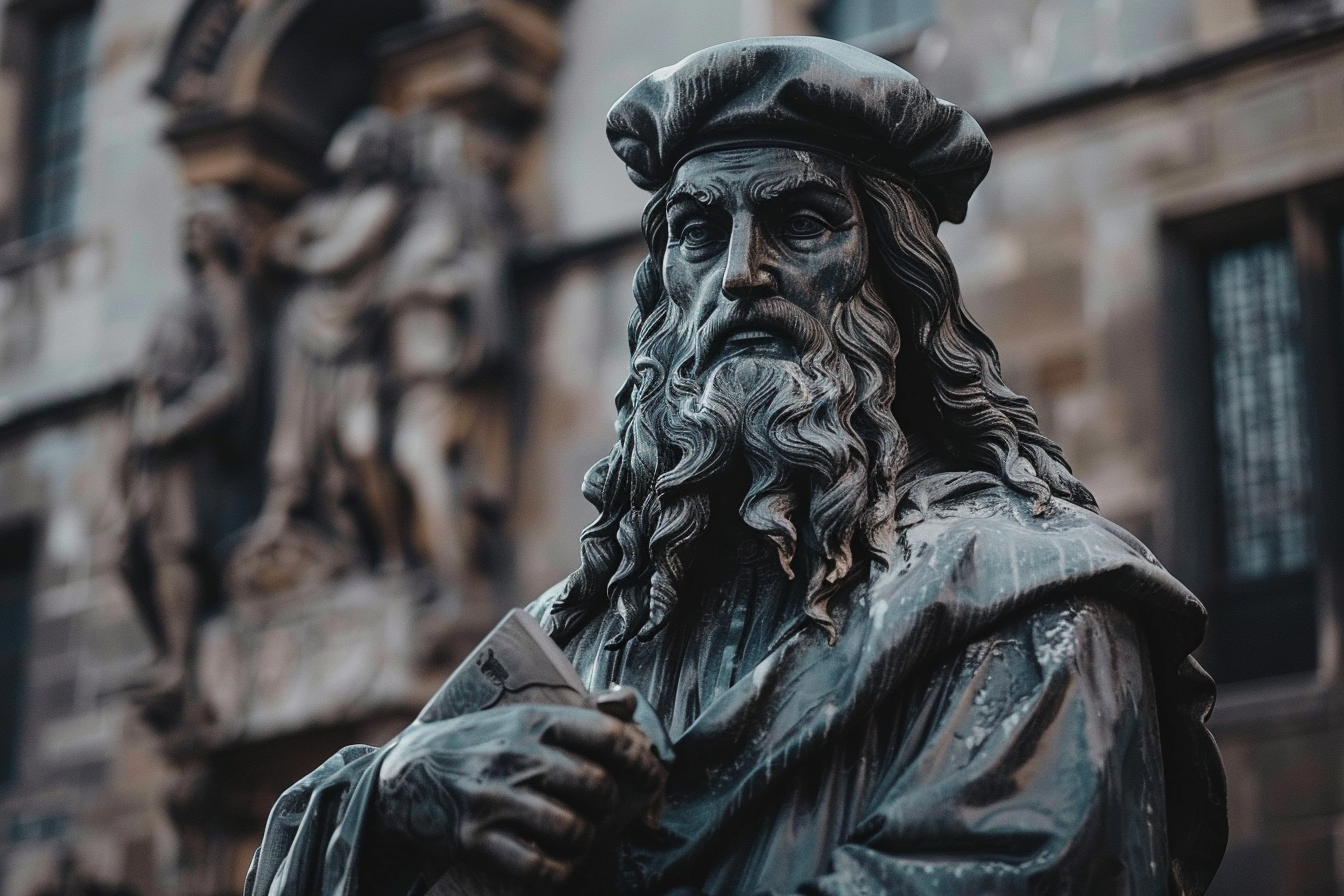
Leonardo da Vinci, the Renaissance polymath, left an indelible mark on human history.
His remarkable achievements in art, science, and innovation continue to inspire and influence people around the world.
In this article, we will delve into the remarkable achievements of Leonardo da Vinci, exploring his contributions to various fields and the lasting impact of his work.
Remarkable Achievements of Leonardo da Vinci
Leonardo da Vinci’s achievements are a testament to his boundless curiosity and creativity.
He was a true Renaissance man, exceling in multiple fields and leaving behind a legacy that continues to captivate and inspire us today.
Artistic field

Leonardo da Vinci excelled in multiple artistic disciplines, each showcasing his exceptional talent and innovative approaches.
- Read also: From Artists to Rulers: 8 Famous Renaissance Women
- Read also: The Renaissance Era’s Impact on Science Advancements
Painting
Leonardo’s paintings, especially the “Mona Lisa” and “The Last Supper,” stand out as some of his most celebrated works.
These pieces are renowned for their lifelike depiction of human emotions.
Leonardo’s use of the sfumato technique, which involves layering thin glazes of paint, creates a soft, hazy effect that enhances the realism and depth of his paintings.
Sculpture
In the realm of sculpture, Leonardo’s works such as the “Horse” and the “Virgin of the Rocks” illustrate his mastery of three-dimensional forms.
He had a unique ability to convey emotion through the careful arrangement of shapes and lines, bringing his sculptures to life with dynamic and expressive figures.
Drawing
Leonardo’s drawings, including the famous “Vitruvian Man,” reflect his incredible attention to detail and his talent for capturing the essence of his subjects with simple yet powerful lines.
His sketches are not only artistically impressive but also demonstrate his deep understanding of human anatomy and proportion.
Scientific field

Leonardo da Vinci’s contributions to science are as impressive as his artistic achievements.
His work in anatomy, engineering, and the natural sciences showcases his exceptional intellect and curiosity.
Anatomy
Leonardo da Vinci’s anatomical drawings reveal his deep understanding of the human body.
Through careful study, he captured the structure and function of muscles, bones, and organs with remarkable accuracy.
His famous anatomical sketches not only advanced medical knowledge but also showcased his ability to depict the complexity of the human form with precision and detail.
Engineering
Leonardo’s innovative spirit shines through in his numerous designs for machines.
His concepts for inventions like the flying machine and the armored vehicle highlight his forward-thinking approach and technical skill.
Although many of his designs were never constructed, they demonstrated his ability to envision and plan complex mechanisms, laying the groundwork for future technological advancements.
Botany and geology
Leonardo’s fascination with nature is evident in his studies of plants and the natural world.
His detailed observations and recordings in botany and geology reflect his talent for careful observation and documentation.
Through his drawings and notes, he captured the intricate structures of plants and the geological formations of the earth, providing valuable insights into these fields.
Innovation field

Leonardo da Vinci’s legacy in innovation spans across urban planning, optics, and military technology, reflecting his visionary thinking and problem-solving skills.
Urban planning
Leonardo envisioned cities of the future with his designs, particularly his concept of the ideal city.
His plans emphasized the importance of cleanliness, organization, and aesthetics to create harmonious urban environments.
Leonardo proposed separating different city functions to improve efficiency and livability, showcasing his forward-thinking approach to urban development.
Optics
Leonardo delved into the mysteries of light and vision, as evidenced by his detailed drawings of the human eye.
His studies explored the fundamental principles of how light behaves and how the eye perceives it.
His work laid the foundation for advancements in optics and vision science, demonstrating his curiosity and passion for understanding the natural world.
Warfare
In the realm of warfare, Leonardo’s inventive mind conceived various military machines, including the armored vehicle and sophisticated catapults.
His designs showcased strategic thinking and innovation, aiming to address the challenges of warfare in his time.
Leonardo’s contributions to military technology reflect his commitment to finding creative solutions to complex problems, driven by a desire for strategic advantage and protection.
Legacy of Those Achievements

Leonardo da Vinci’s impact on art, science, and innovation is profound and far-reaching.
His contributions continue to inspire and influence people across the globe, reminding us of the importance of curiosity, creativity, and forward thinking.
Lasting influence
Leonardo’s achievements have left an enduring imprint on various fields.
Artists draw inspiration from his unparalleled ability to capture human emotion and form, while scientists find guidance in his groundbreaking studies in anatomy, engineering, and optics.
Source of inspiration
His legacy serves as a wellspring of inspiration for aspiring creators and researchers alike.
By daring to challenge norms and explore the unknown, Leonardo set a precedent for future generations to push boundaries and strive for greatness.
Driving progress
Leonardo’s approach to problem-solving and innovation continues to shape contemporary thinking.
His interdisciplinary mindset and relentless pursuit of excellence serve as a catalyst for progress, encouraging collaboration and the pursuit of solutions to complex challenges.
- Read also: Renaissance Invention Timeline: Innovations That Transformed History
- Read also: Top 5 Nikola Tesla’s Inventions List That Changed The World
Conclusion
Leonardo da Vinci’s remarkable achievements in art, science, and innovation continue to captivate and inspire us today.
His work serves as a testament to the power of human creativity and innovation, and his legacy will undoubtedly continue to shape our understanding of the world for generations to come.



